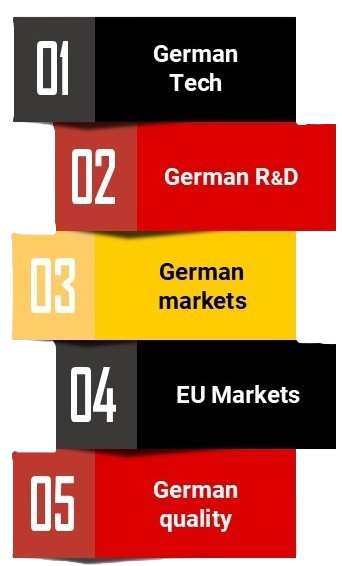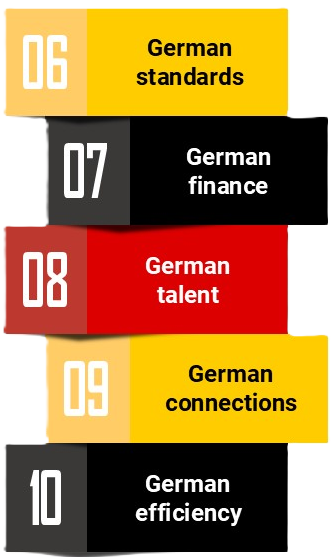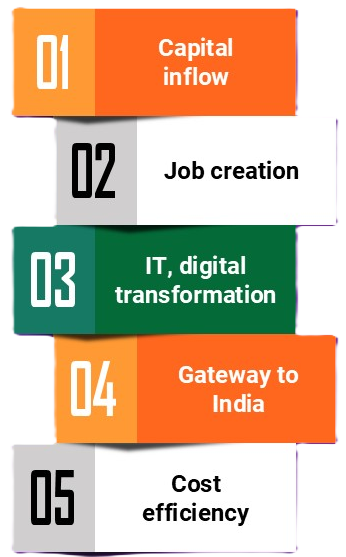Why Germany?
Germany: Where Indian Ambition Meets Global Opportunity


©2025 Steve Lovelace


How Indian Companies Benefit from Business with Germany
Indian companies benefit significantly from investing in or collaborating with Germany across multiple dimensions, leveraging Germany's economic strengths and strategic position. Here's a structured overview of the key benefits:
Technological Advancements & Innovation
Access to Cutting-edge Technology: German leadership in engineering, automotive, and manufacturing allows Indian firms to gain through tech transfers, joint ventures (e.g., Mahindra with German automakers), and exposure to Industrie 4.0 (smart manufacturing).
R&D Collaboration: Partnerships with German institutions and companies (e.g., Siemens, Bosch) foster innovation, particularly in sectors like renewable energy and pharmaceuticals.
Market Expansion
EU Gateway: Germany’s central location in Europe provides access to the EU’s 450 million consumers, high purchasing power, and streamlined logistics.
Trade Agreements: Leveraging Germany’s EU trade networks reduces tariffs and barriers for global exports.
Quality & Brand Enhancement
Reputation Boost: Association with German quality (e.g., Tata's acquisition of Jaguar Land Rover) elevates brand credibility globally.
Operational Standards: Adopting German precision and efficiency improves product quality and processes.
Financial Incentives
Government Support: Subsidies, tax breaks, and grants from German agencies like GTAI lower entry costs for sectors like renewables and IT.
Skilled Workforce & Education
Talent Acquisition: Access to Germany’s highly skilled labor in technical fields strengthens R&D and engineering capabilities.
Educational Partnerships: Collaborations with institutions like Fraunhofer enhance employee training and innovation.
Regulatory & Legal Stability
Transparent Frameworks: Predictable business environments reduce risks, aiding compliance with EU regulations (e.g., GDPR for IT firms like Infosys).
Sustainability Leadership
Green Technologies: German expertise in renewables (e.g., wind/solar) offers Indian companies like Suzlon Energy opportunities in sustainable markets.
Strategic Partnerships & Networking
Industry Connections: Participation in trade fairs (e.g., Hannover Messe) fosters B2B collaborations and supply chain integration.
Cultural Exchange & Efficiency
Work Culture Adoption: Learning German operational efficiency (punctuality, process rigor) enhances productivity.
Sector Specific Opportunities
Automotive & EVs: Collaboration in electric vehicles (e.g., Mahindra’s partnerships).
IT & Digitalization: Engagement in IoT and AI through Germany’s digital infrastructure.
In essence, Indian companies gain technological prowess, market reach, quality elevation, and sustainable growth, positioning them competitively in global markets.




How German Companies Benefit from Indian Investment in Germany
German companies derive substantial benefits from Indian investments and collaborations in Germany, fostering mutual growth and strategic advantages. Here’s a structured breakdown of these benefits:
Capital Inflow and Economic Growth
Investment Boost: Indian companies inject capital into Germany through acquisitions, greenfield projects, or joint ventures, stimulating local economies. For example, Bharat Forge’s investments in German automotive manufacturing enhance production capacity.
Job Creation: Indian firms like Infosys and TCS establish offices in Germany, creating high-skilled employment opportunities and supporting local talent development.
Technology and Innovation Synergies
IT and Digital Transformation: Indian IT giants (e.g., Wipro, HCL) partner with German industries to accelerate digitalization, Industrie 4.0 adoption, and AI integration, enhancing German manufacturing efficiency.
Pharmaceutical Collaboration: Indian biotech firms like Dr. Reddy’s collaborate with German counterparts on R&D, combining India’s cost-effective research with Germany’s advanced clinical trial infrastructure.
Access to the Indian Market
Gateway to India: German companies leverage Indian partners’ local expertise to navigate India’s complex market. For instance, Siemens and Bosch utilize Indian investments to strengthen their supply chains and distribution networks in India.
Trade Facilitation: Joint ventures reduce barriers to entry, enabling German SMEs to tap into India’s 1.4 billion consumers.
Cost Efficiency and Operational Optimization
Outsourcing Opportunities: German firms benefit from Indian expertise in cost-efficient IT services, back-office operations, and engineering solutions, improving competitiveness.
Supply Chain Resilience: Indian investments in German logistics and manufacturing (e.g., Mahindra’s automotive ventures) enhance supply chain diversification and risk mitigation.
R&D and Knowledge Exchange
Collaborative Innovation: Indian companies invest in German R&D hubs, such as Biocon’s partnerships in biopharma, merging India’s R&D agility with Germany’s technical precision.
Academic Partnerships: Ties between Indian institutes (e.g., IITs) and German universities (e.g., Fraunhofer) foster cutting-edge research in renewable energy and AI.
Cultural and Strategic Enrichment
Diverse Workforce: Indian firms introduce multicultural teams, fostering creativity and cross-cultural problem-solving in German workplaces.
Entrepreneurial Practices: German companies adopt agile business models and frugal innovation techniques from Indian partners, enhancing adaptability.
Sector-Specific Advantages
Automotive and EVs: Collaborations in electric mobility (e.g., Tata Motors and German tech firms) drive advancements in battery technology and sustainable transport.
Renewable Energy: Indian solar companies like Adani Green partner with German engineering firms to scale clean energy solutions globally.
Strengthened Bilateral Relations
Policy Alignment: Investments reinforce the Indo-German Strategic Partnership, leading to favorable trade policies and reduced tariffs.
Diplomatic Leverage: Economic ties enhance political cooperation on global issues like climate change and digital governance.




Challenges to Indian Firms Operating in Germany
Indian firms operating in Germany may encounter several challenges due to differences in business environments, cultural practices, regulatory frameworks, and economic conditions. Here are some of the key difficulties they might face:
Regulatory and Bureaucratic Hurdles
Complex Regulations: Germany has a well-defined but complex regulatory environment. Navigating through these regulations, especially for foreign firms, can be challenging.
Compliance Requirements: Strict compliance with labor laws, environmental regulations, and data protection laws (such as GDPR) can be demanding.
Taxation Issues: Understanding and complying with the German tax system, including corporate taxes, VAT, and other levies, can be complex.
Cultural Differences
Business Practices: German business culture is formal and structured, with a strong emphasis on punctuality, precision, and thorough planning. This may contrast with the more flexible and relationship-oriented business practices common in India.
Communication Styles: Germans tend to be direct and straightforward in their communication, which may be perceived as blunt by Indians who are accustomed to more indirect communication.
Work Ethic: Germans place a high value on work-life balance, and there is a strong emphasis on efficiency and productivity during working hours. This may differ from the sometimes longer working hours and different work-life balance perceptions in India.
Market Competition
Established Competitors: German markets are highly competitive, with many well-established local and international firms. Breaking into these markets can be challenging for new entrants.
Quality Standards: German consumers and businesses have high expectations regarding quality and reliability. Meeting these standards can be demanding for Indian firms.
Labor Market Issues
Skill Gaps: While Germany has a highly skilled workforce, there may be specific skill gaps that Indian firms need to address, especially in high-tech and specialized industries.
Labor Laws: Germany has stringent labor laws that protect workers' rights, including regulations on working hours, contracts, and employee benefits. Navigating these laws can be complex.
Language Barrier: Proficiency in German is often necessary for effective communication and integration into the local business environment. This can be a barrier for Indian firms.
Intellectual Property (IP) Concerns
IP Protection: While Germany has strong IP protection laws, understanding and navigating these laws to protect innovations and trademarks can be challenging for foreign firms.
Economic and Political Risks
Economic Stability: While Germany is economically stable, global economic fluctuations and trade policies can impact business operations.
Political Environment: Changes in government policies or political climate can create uncertainties for businesses.
Supply Chain and Logistics
Logistics Efficiency: While Germany has excellent infrastructure, integrating into the local supply chain and logistics network can be challenging for new entrants.
Vendor Reliability: Establishing reliable local suppliers and partners is crucial for smooth operations.
Environmental and Sustainability Concerns
Sustainability Standards: Germany has high environmental and sustainability standards. Complying with these standards can be demanding but is essential for market acceptance.
Legal Disputes
Judicial System: The German legal system is efficient but can be complex. Understanding local legal practices and resolving disputes can be challenging for foreign firms.


Cultural Challenges to Indian Firms in Germany
Indian firms operating in Germany encounter several cultural challenges stemming from differences in business practices, communication styles, and societal norms.
Communication Styles
Directness vs. Indirectness: Germans value straightforward, explicit communication, which can be perceived as blunt by Indians accustomed to nuanced, relationship-preserving dialogue. This may lead to misunderstandings, such as German colleagues viewing Indian indirectness as evasive, while Indians might find German directness abrupt.
Hierarchy and Decision-Making
Flat vs. Hierarchical Structures: German workplaces often emphasize egalitarianism and employee autonomy, with decisions made collaboratively. Indian firms, typically hierarchical, may struggle with delegating authority, causing frustration among German employees expecting participatory decision-making.
Work-Life Balance
Rigid vs. Flexible Hours: Germans prioritize strict separation between work and personal time (e.g., Feierabend—quitting time). Indian firms, used to flexible hours and overtime, may face pushback if expecting after-hours availability, leading to employee dissatisfaction.
Negotiation and Business Practices
Formality vs. Flexibility: German negotiations rely on detailed contracts, punctuality, and structured agendas. Indian firms, which may view contracts as adaptable and emphasize relational trust, could encounter friction over timelines or perceived informality.
Regulatory Compliance
Cultural Emphasis on Order: Germany’s stringent labor, environmental, and data laws reflect a cultural preference for precision. Indian firms unfamiliar with such rigor may face compliance hurdles, especially regarding co-determination (*Mitbestimmung*) laws requiring employee input in management.
Language Barriers
Local Language Nuances: While many Germans speak English, legal documents and nuanced negotiations often require German. Misinterpretations may arise without proficient German-speaking staff, affecting contracts or workplace integration.
Cultural Integration and Diversity
Adapting to Local Norms: German corporate culture values punctuality, planning, and consensus. Indian firms must adjust practices (e.g., meeting protocols, long-term planning) to align with these expectations, which may conflict with more fluid Indian approaches.
Trust and Relationship Building
Long-Term Orientation: Germans often build trust gradually through consistent performance. Indian firms, emphasizing quick relationship-building, may need patience to establish credibility in a market valuing thorough vetting.
Labor Relations
Collaborative Governance: Strong unions and employee councils in Germany expect active roles in decision-making. Indian firms accustomed to top-down management may find it challenging to navigate this collaborative model.
Technological Expectations
High Standards for Innovation: Germany’s emphasis on engineering excellence requires Indian firms to invest in R&D and quality assurance to meet local expectations, potentially straining resources.


